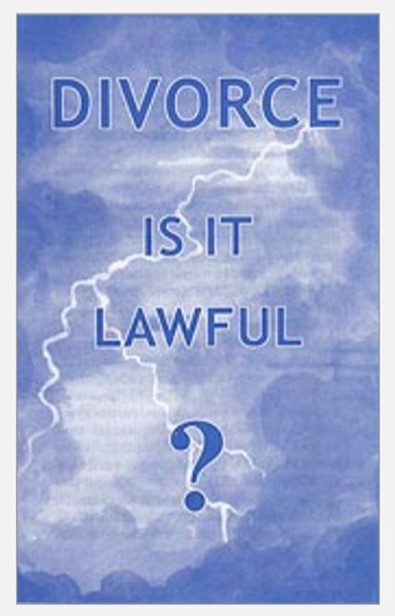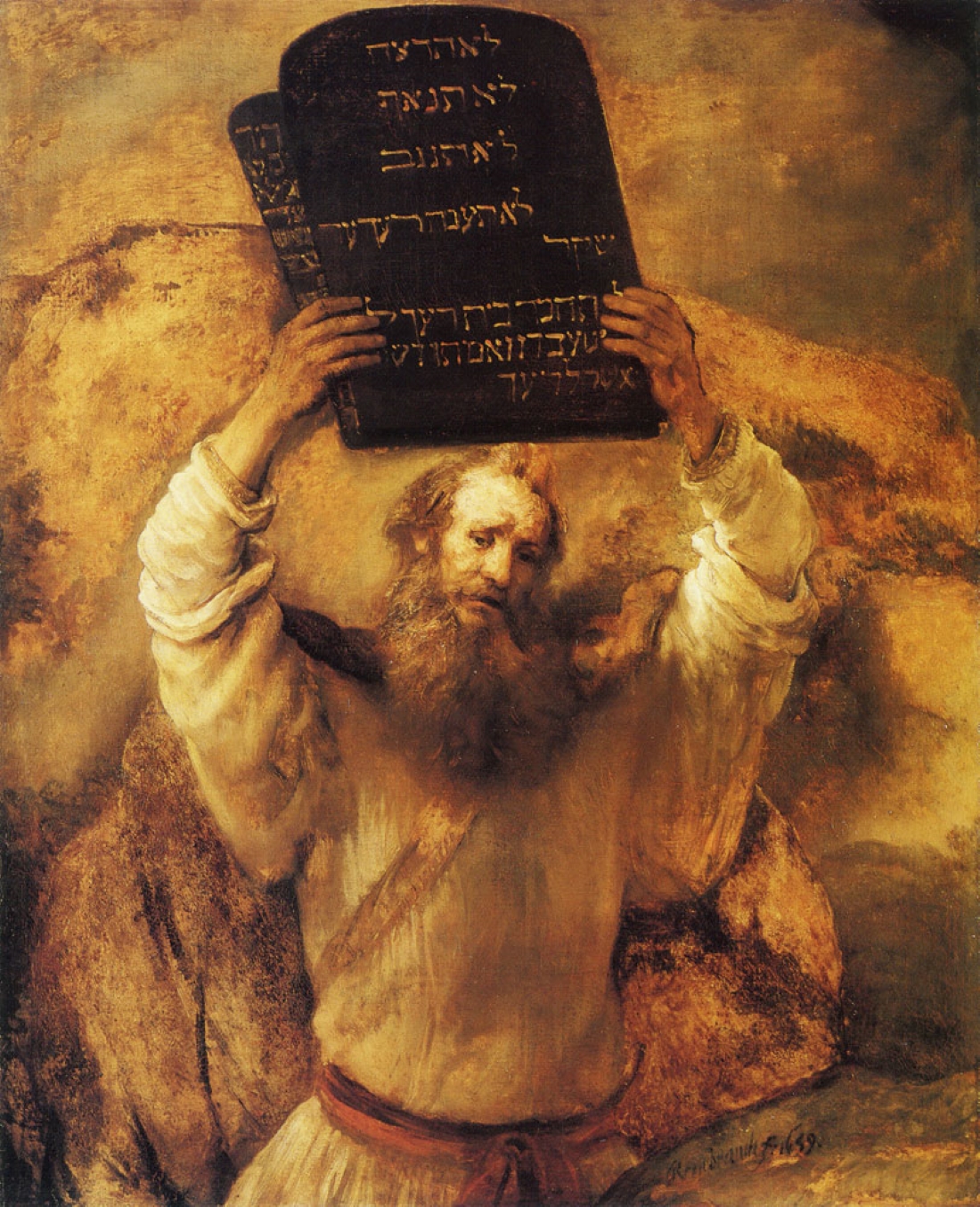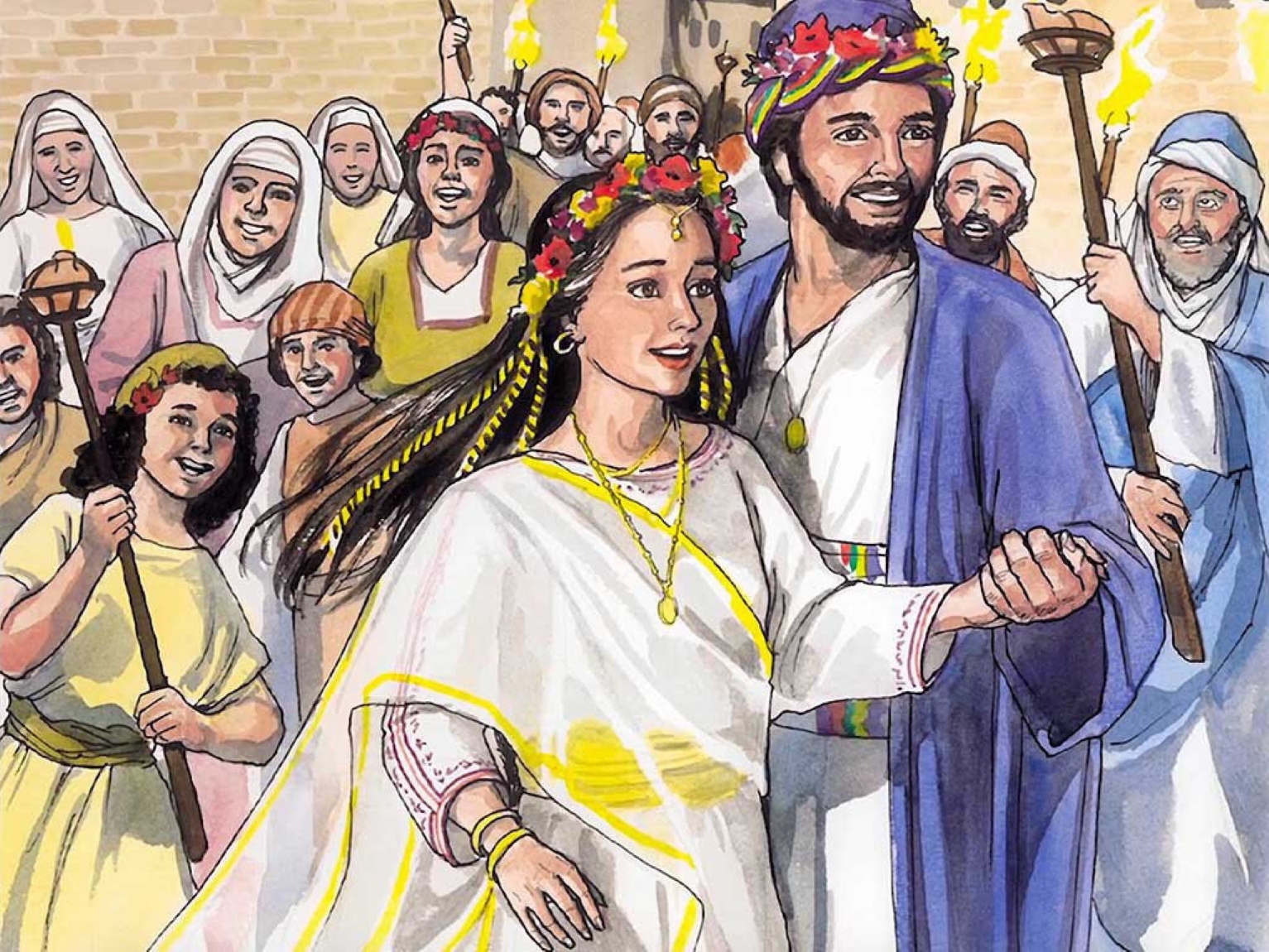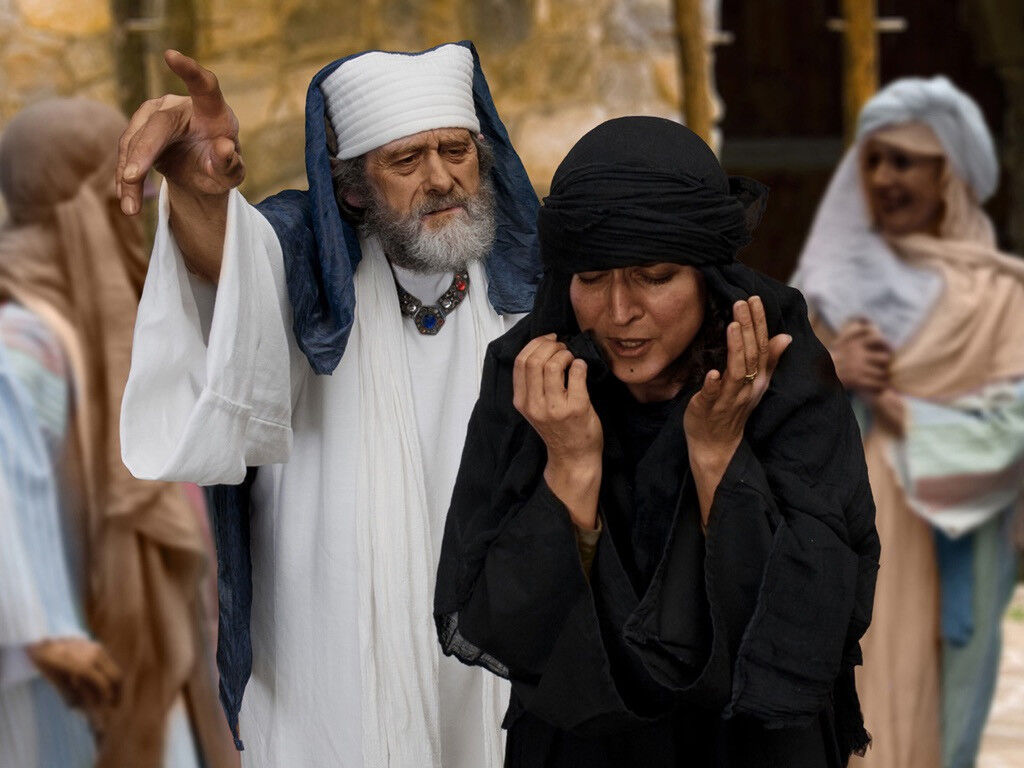This post continues my series on Jesus, divorce, and remarriage, which starts with a walk through Matthew 19. Having considered the question Did Jesus believe that marriage is indissoluble? I am now considering a “should” question: Did Jesus believe divorce and remarriage are always wrong? Here are my posts so far:
Jesus on Divorce and Remarriage: Introduction (JDR-1)
Hyper-Literalism, Could vs. Should, and a Guiding Question (JDR-2)
“Cleave” Does Not Imply an Unbreakable Bond (JDR-3)
“One Flesh” Does Not Imply an Unbreakable Bond (JDR-4)
“God Has Joined Together” Does Not Imply an Unbreakable Bond (JDR-5)
Genesis 2:24 as God’s Creation Norm for Marriage (JDR-6)
“Let Not Man Separate” Implies a Breakable Bond (JDR-7)
“Moses Allowed You to Divorce” Suggests a Breakable Bond (JDR-8)
Why Did “Hardness of Heart” Cause God to Allow Divorce? (JDR-9)
Summary of this post: Jesus accused a specific audience of “hardness of heart”: men who believed they had a right to divorce their wives for virtually any reason—something I’ve never heard any Christian teach. Nearly all Jewish men in Jesus’ day believed this; there is no historical evidence the divorce debate between the “liberal” Hillelites and “conservative” Shammaites had yet begun. Further, Jesus was responding to one particular proof text used by these men—Deuteronomy 24:1. It was the abuse of this text that drew Jesus’ ire, not the proper use of other OT divorce laws designed to protect women. Given this context, we are not justified in saying that everyone who seeks divorce has a hard heart.
Whose Hearts Were Hard?
In my last post I began discussing Jesus’ explanation for why God allowed divorce under the law of Moses: “because of your hardness of heart” (Matt. 19:8). As Israel repeatedly showed hardness of heart, God gave them more laws, including ones about divorce. These laws were both a concession to human weakness and a protection for those with hard-hearted spouses.
In this post I want to be more precise: Whose hearts, specifically, were hard? Whom was Jesus accusing of hardness of heart?
Let me begin answering this question by sharing several bad “translations” of Jesus’ words.
Jesus did not say this: “Because of Israel’s hardness of heart, Moses allowed them to practice divorce.” No, Jesus directed his rebuke directly to the Pharisees in front of him: “Because of your hardness of heart…” Meier notes the force of Jesus’ rebuke:
By claiming that Moses wrote this commandment for “you” (i.e., the Pharisees) to expose “your” hardness of heart, …Jesus implicitly lumps the Pharisees together with the rebellious Israelites of the wilderness generation. The Mosaic Law they presume to cite as experts actually bears witness against them.[1]
Nor did Jesus say this: “Because of your hardness of heart Moses allowed you to practice divorce.” That is more general than Jesus’ words. And he certainly did not say this: “Because of the hardness of your wives’ hearts, Moses allowed you to divorce them.”
Rather, Jesus said this: “Because of your hardness of heart Moses allowed you to divorce your wives.” In sum, Jesus was addressing his rebuke directly to the persons before him: men who were wrongfully divorcing their wives.[2]
Roberts makes the same point:
The people with hard hearts were those divorcing their wives, which means the callous individuals in question must have been male… Jesus… does not say, “Moses, because of the hardness of their hearts, permitted you to divorce your wives.” Nor does he implicate Israelites in general by saying, “Moses, because of your hardness of heart, permitted those divorces.” As it stands, Jesus’ sentence specifically implicates hardhearted husbands.”[3]
Before we extend Jesus’ rebuke of hardness of heart to everyone considering divorce, we should ask why Jesus accused these husbands of hardness of heart. Why were they divorcing? What did they believe about divorce?

What Did Jesus’ Audience Believe about Divorce?
Jesus’ teachings against divorce were given in a specific historical context. In all four records we have of Jesus teaching on divorce (Matt. 5:31-32; 19:3-12; Mark 10:2-12; Luke 16:18) he was correcting the false teachings of the same group: men who were arguing that God’s law gave them the right to divorce their wives for virtually any reason they might mention.
Most modern writers say that two views on divorce were debated by Jews in Jesus’ day—the view of Rabbi Hillel, a “liberal” who said Deuteronomy 24 gives grounds for “any-cause” divorce (cf. Matt. 19:3) and the view of Rabbi Shammai, a “conservative” who said Deuteronomy permits divorce only on the grounds of adultery.[4] Wenham clarifies that “on the issue of divorce, it was the Hillelites who were upholding tradition, and the Shammaites who were challenging it.” In fact, “to limit the husband’s right to divorce whenever he chose and for any reason was for most Jews a shocking limitation on male freedom.”[5]
[Edit (3/28/2023): After private correspondence with David Instone-Brewer, I now believe my main thesis in this section is still correct, but my next several paragraphs (in gray) are incorrect. Here is part of what he told me: “Yes, there is good evidence and it is the consensus, that Shammaites were current in Jesus’ day, and were not current after 70CE. That is, their followers did not survive the Destruction... I don’t know any evidence that divorce for any cause (the atomistic Hillelite interpretation of Deut.24.1) was known before Hillel’s interpretation. It is only ‘traditional’ in that it became the dominant form of divorce, and supplanted the biblical grounds by making them unnecessary. So it is true to say that it is now traditional, but it wasn’t before Hillel. Yes, Josephus and Philo only mention the Hillelite interpretation, which had already gained the ascendancy.”]
Wenham’s clarification is crucial but may not go far enough. It’s possible that the debate between the Hillelites and the Shammaites had not even yet begun in Jesus’ day. Luck observes that “Josephus does not mention the distinction [between Hillel and Shammai], merely stating the position of Hillel as if it were the only position in vogue.”[6] Meier surveys Jewish intertestamental writings on divorce at length and concludes that “the mainline tradition begun in the OT and witnessed in Philo, Josephus, and the School of Hillel” allowed divorce for “practically any reason.”[7] The only known possible exception (besides Jesus) is the Essenes, a mystic Jewish sect, but this is disputed; Meier concludes that “their position on divorce remains a question mark.”[8]
Given this evidence, some of the best-informed scholars warn against assuming Jesus was responding to the Hillel – Shammai divorce debate. Here, for example, is Meier (see footnote for more):
Nowhere in pre-70 Judaism is there any clear attestation of a detailed discussion or debate on which grounds for divorce are deemed sufficient. Therefore, despite the almost universal tendency on the part of NT exegetes to explain Jesus’ prohibition of divorce against the “background” of the debate between the House of Shammai and the House of Hillel, this tendency may actually be a prime example of the anachronistic use of later texts to explain earlier ones. That is, a text written down for the first time at the beginning of the 3d century A.D. (the Mishna) is called upon to elucidate a teaching of Jesus reaching back to the early part of the 1st century A.D.[9]
What does this all mean for our question about Jesus’ original audience? When Jesus rebuked the Pharisees for hardness of heart, he was addressing the sort of man who thought he had a right to divorce a wife if she had burned his supper or even simply if he wanted to replace her with a more beautiful one.
The Abuse of Deuteronomy 24:1 as a Proof Text
Further, in at least three of the four passages where Jesus teaches on divorce,[10] he was directly responding to a badly-distorted interpretation of one particular proof text that men were using to justify their divorces—Deuteronomy 24:1, the only text in the law of Moses to mention a “certificate of divorce.” This is evident, for example, in Matthew 5:31, where Jesus quotes a misinterpretation of that passage: “Whoever divorces his wife, let him give her a certificate of divorce.”
The same is true in Matthew 19 and in the parallel account in Mark 10. When Jesus said, “Moses allowed you to divorce your wives” (Matt. 19:8), he was referring most directly to Deuteronomy 24:1, the text just cited by the Pharisees (“Why then did Moses command one to give a certificate of divorce and to send her away?” Matt. 19:7).
If Jesus meant to comment also on OT laws that directly commanded divorce (Ex. 21:10-11 and Deut. 21:14), then his statement makes best sense as an explanation of why these laws were necessary: Abused wives needed release from hardhearted husbands. Significantly, we have no record of Jesus rebuking wives who asked for divorce certificates to escape abusive or criminally negligent husbands.
In short, it was the abuse of Deuteronomy as a proof text justifying any-cause divorce that drew Jesus’ ire, not the proper use of other OT divorce laws designed to protect women.

Applying Jesus’ Warning about “Hardness of Heart” Today
These observations about Jesus’ original audience are rarely considered, but are crucial. If we don’t recognize the original target of Jesus’ warning about hard hearts, then we are likely to misapply his words today.
When Jesus spoke against divorce, he was most certainly not speaking to, say, wives or husbands who were wondering what they should do after their spouses had abused or abandoned them. Nor was he speaking to Mennonites who were arguing over whether only separation is permitted or if sometimes divorce (but never remarriage) might also be okay. He was not speaking even to evangelical scholars who were teaching that there are two clear biblical grounds for both divorce and remarriage (adultery and abandonment)—or perhaps three (adding abuse).
No, every time Jesus rebuked divorce, he was responding to people promoting a teaching that is so egregious that I have never heard it argued today from any Christian leader—not even from those who argue that divorce is okay at will upon mutual consent. Jesus was rebuking the idea that a man has a God-given, biblical right to divorce his wife for anything at all that he might find unsatisfactory about her; all that really matters is that he goes through the correct legal hoops to provide a valid “certificate of divorce.”
Can you imagine any Christian leader making that argument today? No wonder Jesus spoke so harshly! And no wonder we, in very different circumstances, are often confused when we read his words without considering their original context.
What might Jesus say if he spoke directly to conservative Anabaptists today—particularly, say, to those hurting from adulterous or abusive spouses? Yes, I am certain he would still direct us to God’s creation intent for marriage, a beautiful and timeless standard of loving permanence. But I am also certain he would word his message very differently, meeting the very different needs of a very different audience.[11] Is it even possible, perhaps, that Jesus would have some words of warning for those who take his rebuke of hardhearted husbands in the Gospels and use them to judge victims of marital betrayal today, denying them release from abusive marriages?
We must be very careful not to go beyond Jesus’ words, making him say things he never said. For example, consider the following statement from a Rod and Staff tract:
Jesus said, “For the hardness of your heart he wrote you this precept.” All who seek divorce have hard, unbelieving hearts.[12]
Really? Does every person who seeks divorce have a hard, unbelieving heart? What about a wife who is seeking divorce to protect her children from an abusive father and husband? What about God in the OT, who divorced his “wife” Israel for her adulterous idolatry (Jer. 3:1, 8)? No, it is not true that “all who seek divorce have hard, unbelieving hearts.”

Looking Ahead: Jesus’ Words and the New Covenant
But didn’t Jesus inaugurate a new covenant standard of marriage permanence that left no room for either hard hearts or separation of marriages? Coblentz expressed this view eloquently:
Divorce was never sanctioned, but under the Old Covenant God permitted it because of the hard hearts of the people of Israel. God permitted it in anticipation of the New Testament era in which He would require a higher standard of righteousness through the grace and light of His Son… Under the New Covenant, hardhearted husbands and wives can be given new hearts by the transforming power of the Spirit. Jesus the heart-changer has come, and God’s standards for marriage can be restored to His intention “from the beginning.” …In the age of the Spirit, therefore, God commands, “Let not man put asunder.”[13]
There is much to commend in Coblentz’s words, but they may also leave us with some questions. Moses allowed divorce, but “from the beginning it was not so,” Jesus said. What did Jesus mean by this? Was he intending to revoke everything Moses had written permitting divorce? Was he inaugurating new divorce restrictions under a new covenant? Answering these and similar questions will require at least a couple more posts.
Thank you for reading! Please share your insights or questions in the comments below.
If you want to support more writing like this, please leave a gift:
[1] John P. Meier, A Marginal Jew: Rethinking the Historical Jesus, Vol. IV, Law and Love (New Haven, CT: Yale University Press, 2009), 177, n. 141.
[2] Yes, Jesus’ words definitely carry implications for women, too. See, for example, Mark’s record of Jesus’ warning to wives: “if she divorces her husband and marries another, she commits adultery” (Mk. 10:12), a text that may reflect a Greco-Roman audience for Mark’s Gospel, where wives had more freedom to divorce. Yet it remains true that when Jesus explained why the Mosaic divorce allowance was given, he specifically rebuked men, not women.
[3] Barbara Roberts, Not Under Bondage: Biblical Divorce for Abuse, Adultery and Desertion (Ballarat, Victoria, Australia: Maschil Press, 2008), 66.
[4] An accurate description of the views of these two rabbis and their disciples would require several paragraphs correcting common misrepresentations. That is beyond the scope of this post.
[5] Gordon J. Wenham, Jesus, Divorce, and Remarriage: In Their Historical Setting (Bellingham, WA: Lexham Press, 2019), 44.
[6] “Josephus does not mention the distinction, merely stating the position of Hillel as if it were the only position in vogue.” William F. Luck, Divorce and Re-Marriage: Recovering the Biblical View, 2nd ed. (Richardson, TX: Biblical Studies Press, 2008), 152.
[7] Meier, ibid., 95.
[8] Meier, ibid., 93.
[9] Full quote from Meier (ibid., 95): “Only when we get to the Mishna do we have, for the first time in Palestinian Judaism, clear documentation of a scholarly dispute over what precisely constitutes sufficient grounds for divorce. As far as datable documents are concerned, this is something startlingly new in Judaism… Nowhere in pre-70 Judaism is there any clear attestation of a detailed discussion or debate on which grounds for divorce are deemed sufficient. Therefore, despite the almost universal tendency on the part of NT exegetes to explain Jesus’ prohibition of divorce against the “background” of the debate between the House of Shammai and the House of Hillel, this tendency may actually be a prime example of the anachronistic use of later texts to explain earlier ones. That is, a text written down for the first time at the beginning of the 3d century A.D. (the Mishna) is called upon to elucidate a teaching of Jesus reaching back to the early part of the 1st century A.D., with written attestation in the 50s by Paul and ca. 70 by Mark. Considering the dearth of any clear attestation of the dispute over the grounds of divorce between the Houses in the pre-70 period, we would do well, at least initially, to explain Jesus’ teaching on divorce solely in light of what is truly prior to and contemporary with the Palestinian Judaism of the early 1st century A.D.”
Similarly, Collins: “Many New Testament scholars capitalize on the disagreement between the school of Shammai and that of Hillel to affirm that the Matthean Jesus sided with the school of Shammai in interpreting Deut 24:1 in a narrow sense, but there is no certainty that the tradition reflected in the Mishnah actually reflects the real halakhic situation before the destruction of the temple… One cannot simply assume that Matthew’s exception clause was formulated within the context of the difference of opinion between the schools of Shammai and Hillel. One cannot, moreover, and without further discussion, simply assume that the tradition in the Mishnah regarding the interpretation of Deut 24:1 reflects the real halakhic situation at the time of Jesus or at the time of the composition of Matthew’s gospel, although this is often presumed to be the case.” Raymond F. Collins, Divorce in the New Testament, Good News Studies, Vol. 38 (Collegeville, MN: Liturgical Press, 1992), 193, 198-99.
[10] Luke 16:18 is unclear. However, given that his teaching in this passage virtually “quotes” his teaching elsewhere, he was probably addressing the same misinterpretation.
[11] Consider how Paul nuanced his message to different audiences in 1 Cor. 7:10-16.
[12] This comes from an anonymous 12-page tract: “Divorce—Is It Lawful?” (Crockett, KY: Rod and Staff, n.d.), 4. Available online: https://www.milestonebooks.com/item/1-3104/
[13] John Coblentz, What the Bible Says About Marriage, Divorce, and Remarriage (Harrisonburg, VA: Christian Light Publications, 1992), 21-23.





